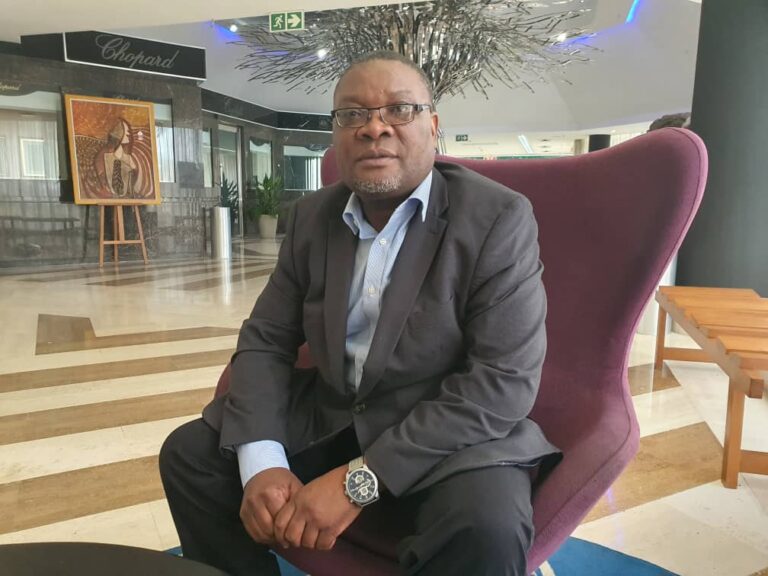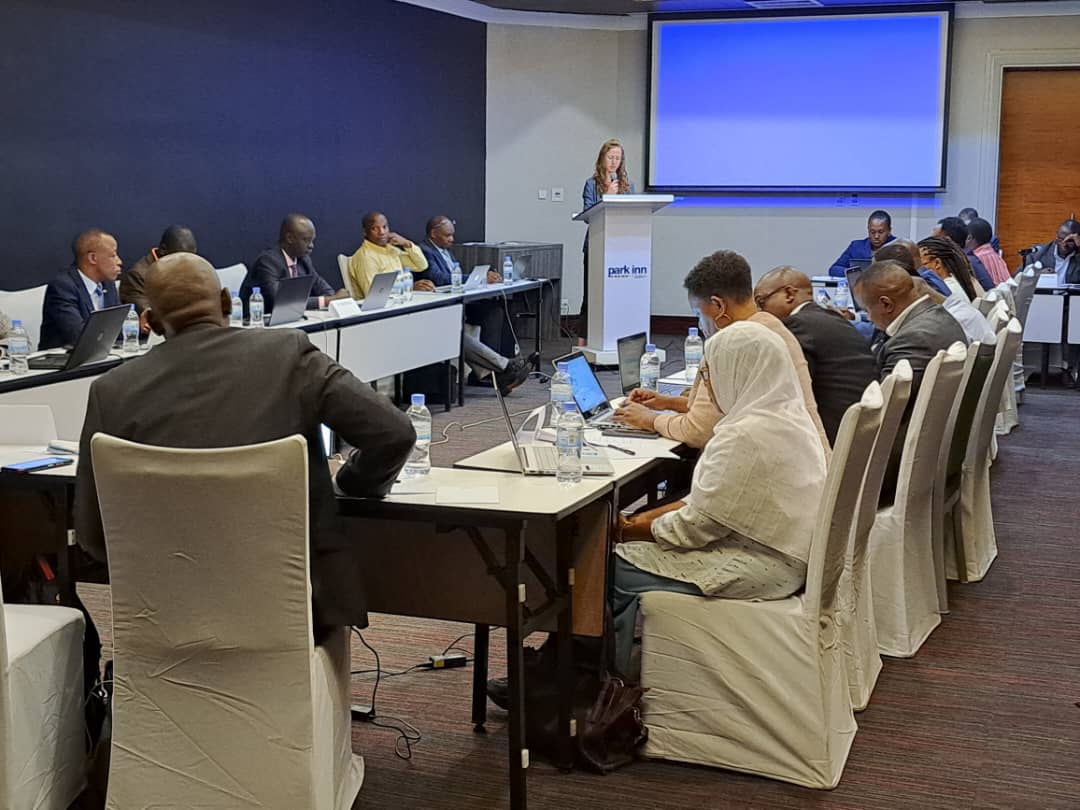
Rongai Chizema, the Senior Programme Manager, Expertise France under the Team Europe Technical Assistance Facility (EU-TAF)
The African Continental Free Trade Area (AfCFTA) Implementation Strategy for the East African Community (EAC) was validated by the Committee of Senior Officials of Trade during a Workshop held at the ParkInn by Radisson, Hotel, Kigali, Rwanda during the period 24th to the 26th of July 2023, according to experts that attended the Session. The Session was well attended, with representatives from South Sudan, Uganda, Burundi, Kenya, Tanzania, the Democratic Republic of Congo (DRC) and Rwanda.
“We have been providing technical support to the EAC as part of the Team Europe – Technical Assistance Facticity (EU – TAF), to enhance implementation of the AfCFTA Agreement. The Project is funded by the EU, Germany, France, and Sweden. The programme mobilizes technical interventions across various work-streams, and beneficiaries, with regional economic communities, being one of those given their role as building blocks for the Africa Economic Community (AEC), – the end goal of continental integration. EU-TAF delivers its support through GIZ, Expertise France and FIIAPP, constituted as implementing partners for the Project.” says Rongai Chizema, the Senior Programme Manager, Expertise France under the Team Europe Technical Assistance Facility (EU-TAF), who attended the event.
The AfCFTA is a flagship project of Agenda 2063 of the African Union and strives to expand and grow intra-African trade by reducing both tariff and non-tariff barriers. Through rallying the full bargaining power of the 55 member states, this is envisaged to enhance Africa’s trading position in the global market by strengthening Africa’s common voice and policy space in international trade negotiations.
“EAC has worked on this project supported by the EU-TAF since the second half of 2022, a process that has led to the development of an inclusive, and responsive regional strategy to drive implementation of the AfCFTA Agreement in the sub-region” revealed Rongai Chizema.
“I’m glad to announce that the report was finalized and adopted by the technical experts, and beyond that, it will now be taken to the Council of Ministers and Permanent Secretaries of Trade of the EAC for final endorsement, paving the way for guiding Member States implementation of the AfCFTA Agreement,” added Chizema.

During the meeting
The EU-TAF Senior Programme Manager noted that the regional economic communities remain the vital anchor for unleashing the full potential and implementation of the AfCFTA Agreement. The agreement, effective since May 2019 following ratification by 22 Member States, now has the support of 47 countries, a testament to the growing political commitment towards economic integration across the continent.
Thus, all the eight economic regional communities, that is, the Arab Maghreb Union (UMA), Common Market for Eastern and Southern Africa (COMESA), Community of Sahel –Saharan States (CEN–SAD), East African Community (EAC), Economic Community of Central African States (ECCAS), Economic Community of West African States (ECOWAS), Intergovernmental Authority on Development (IGAD), and Southern African Development Community (SADC), – the building blocks for the Africa Economic Community, will be envisaged to play an active role in this strategic journey of continental integration.
The AfCFTA creates the largest Free Trade Area by number of countries, at 55, with a market of at least 1.27 billion, and a Gross Domestic Product (GDP) in excess of US$3 trillion, opening up business opportunities to higher trading and commercial horizons. Premised on ushering in a liberal trading regime through eliminating tariff and non-tariff barriers, this noble initiative has the scope to drive both domestic and foreign direct investment, thus anchoring prospects for Africa’s industrialisation exploits.
He highlighted that the AfCFTA can only be realised if all the regional economic communities (RECs) are working very well in a coordinated manner. Many of these RECs have already developed strategies for implementing the AfCFTA agreement, while others have made notable progress towards this goal.
The Validation Workshop was also graced by the presence of Elly FRIEL, Programme Officer at the European Union Delegation to Rwanda, who represented the Ambassador. In her remarks, she commended the EAC for formulating the regional strategy. She emphasized that regional economic integration remains key in the strategic planning and agenda of the sub-region.
Amplifying the linkage between the AfCFTA and the RECs, Friel highlighted that the Agreement envisages that RECs that have already achieved deeper integration will continue to apply their regional trade regimes for intra-regional trade. Given that the majority of intra-African trade is conducted within RECs, these institutions will continue to play a central role in the African trade landscape.
Prudence Sebahizi represented the AfCFTA Secretariat. Sebahizi elaborated on the importance of regional economic communities in the whole work plan for the AfCFTA. He noted that the EAC is one of the most integrated regions of the continent, and thus stands better to benefit from the AfCFTA agreement if member states take initiatives to implement the liberalized trade regimes that come along with this bold continental initiative.
Meanwhile, Chizema disclosed that a lot of positive progressive activities have happened since the AfCFTA became operational in January 2021, in spite of the adverse impact and disruption of the novel COVID-19.
“The most important thing to appreciate is that in February 2023 AU Summit (37th AU Assembly) approved three protocols of the AfCFTA,” said Chizema the Senior Programme Manager on the Team Europe Technical Assistance Facility (Africa Economic Integration) during an exclusive interview with Rwanda News Agency on the sidelines of the EAC Validation Session. The protocols approved included: Competition Policy, Intellectual Property Rights and Investment Policy.
Chizema said that, given a clearance of these protocols, domestication by member states, therefore, becomes the next stage, to pave the way for the realization of the benefits of the AfCFTA, Agreement.
He highlighted that the ongoing project provides technical assistance to the AfCFTA Secretariat headquartered in Accra, Ghana. In his words
“This support is meant to strengthen the role of the AfCFTA Secretariat to coordinate negotiations, whilst at the same time enhancing their role towards overseeing the implementation of the AfCFTA agreement,” he said.
He noted that the project was vital in fast-tracking economic recovery in the aftermath of the COVID-19 pandemic, given its emphasis on clearing the technical hurdles in the implementation of the AfCFTA agreement. Chizema acknowledged the expanded role of the private sector in the scheme of things, given that they are the engine for investment, job creation and hence, economic growth. Therefore, the project also extends support to maximise the role of the Private Sector in the AfCFTA implementation.
“There is no doubt that an active engagement of the private sector in the AfCFTA agenda, will create the requisite business-enabling and regulatory regime, creating conditions that bring benefits of the AfCFTA to the surface,” Chizema highlighted.
“You would appreciate that this project is important coming on stream timely when the Continent is seized with initiatives towards rebuilding in the post-COVID-19 era. This phase of economic progress requires critical industrial production and trade capacity to unleash the full benefits of the free trade area,” stressed Chizema.
“Since early 2022, the programme has been supporting the AfCFTA implementation, with implementing partners constituted as the Project Management Unit, based at the Secretariat in Accra, Ghana. The implementing partners are made up of GIZ, Expertise France, and FIAAP,” Chizema added.
Chizema represents Expertise France under the Project. To date, the programme has mobilized strategic technical support to the Secretariat, across various work-streams to enhance the implementation of the FTA agreement.
The expert disclosed that they also work closely with the African Union (AU) Commission, given their continental trade and industry policy oversight role.
“The AfCFTA also revolves around member states as the custodians of the agreement, hence the project has dedicated resources towards enhancing their capacity to negotiate the agreement, coupled with its implementation. Member states have to work on their internal regulatory institutions to align the AfCFTA protocols with their own regulatory protocols at the national level – that work requires technical assistance/support and our project provides interventions in those areas to enhance trade reforms. These are key components of the domestication phase, and thus continuous technical support cannot be underplayed,” he stressed.
The project also provides support to African Union Agencies such as NEPAD because all the agencies on the Continent are key in the implementation of the AfCFTA agenda. It is given these other strata of beneficiaries under the Project that Sekou Berete, the Project Management Unit Team Lead of the EU-TAF, who also attended the Session seized the opportunity to share on the Ad-Hoc Support Mechanism of the facility.
The Ad-Hoc Support Fund that came on stream on 21st July 2023, benefits member states, RECs such as the EAC and Africa Union agencies, AUD – NEPAD being an example, and the continental and regional Private Sector Associations and other private sector-related organizations and representative structures, availing technical assistance on a demand-driven basis to embark on those activities that strengthen their capacity to effectively engage on the AfCFTA Agenda.
Lastly, Chizema observed, “This project is therefore, no doubt, a strategic vehicle to unleash the full potential of the AfCFTA agreement for the benefit of the continent, one likely to deliver an indelible milestone on the continent’s journey towards establishing an African Economic Community, in the not-too-distant future, if all targeted initiatives are implemented religiously. It could be a test for Africa to turn political rhetoric into reality”. (End)
